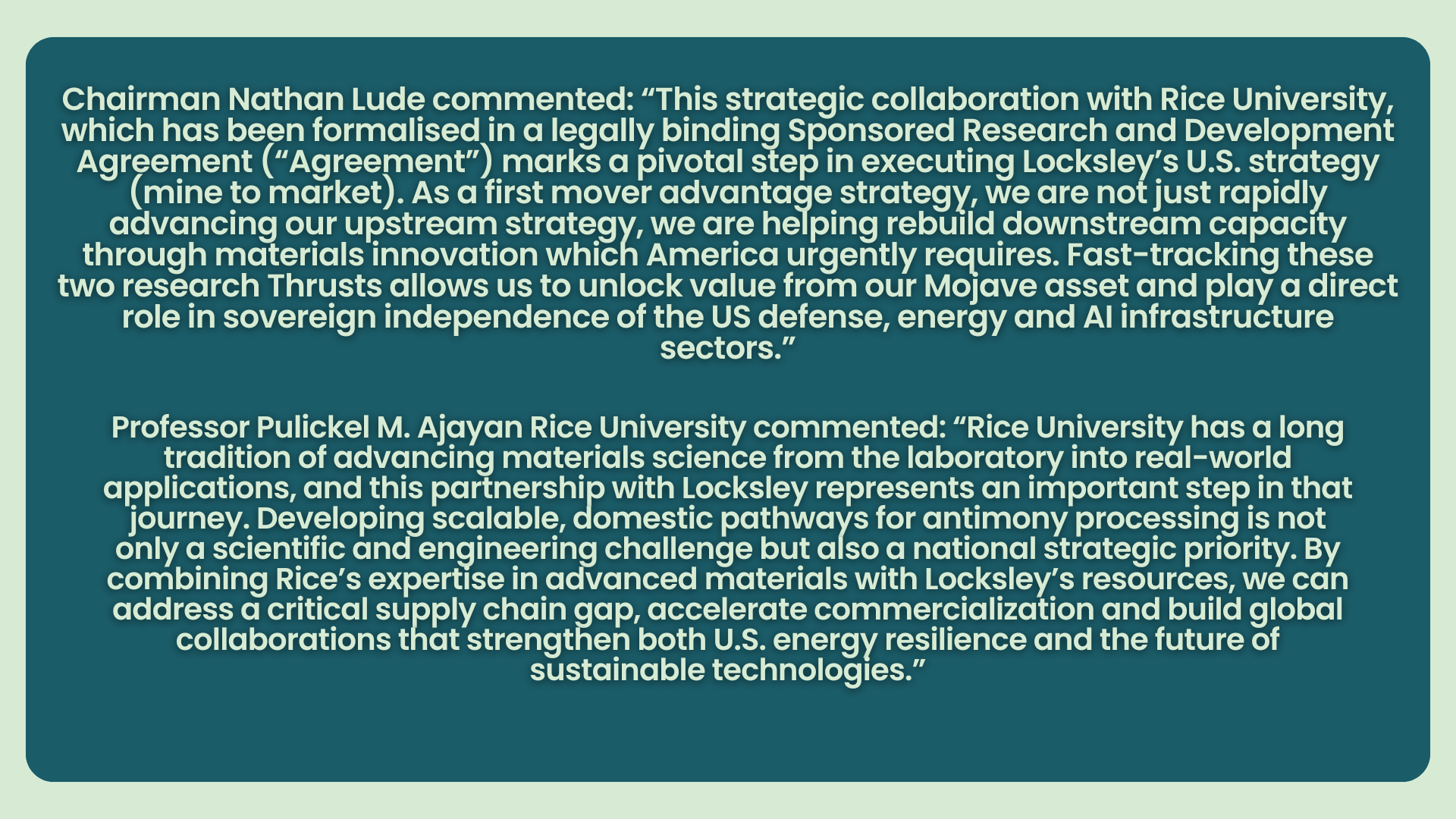
Locksley Resources Ltd (ASX: LKY / OTCQB: LKYRF) has taken a major step in executing its U.S.-focused downstream innovation strategy, announcing a strategic partnership with Rice University, a global leader in nanotechnology, materials science, and energy innovation .
This collaboration marks the beginning of a dual-initiative program that combines upstream antimony development at the company’s Mojave Project in California with cutting-edge research on processing and materials applications in the United States.
Chairman Nathan Lude described the agreement as a “pivotal step” in aligning Locksley’s strategy with America’s critical mineral needs:

Source: LKY ASX Annoucement
Antimony is classified as a critical mineral under U.S. law and has wide-ranging applications in defense, energy, semiconductors, and flame-retardant materials. It is essential for manufacturing ammunition, missile systems, propellants, electronic components, and advanced energy storage technologies.
Currently, the United States has no commercial-scale antimony processing facilities, with 79% of supply imported from China . Locksley aims to fill this gap by establishing the first domestic processing capacity, strengthening supply chain security at a time when geopolitical tensions are reshaping global trade.
The Rice–Locksley agreement focuses on two core research “Thrusts”:
Locksley’s timing aligns with President Trump’s recent Executive Orders calling for increased domestic mineral production and supply chain reshaping. By embedding its project into America’s broader energy and defense strategy, the company positions itself for government funding opportunities and strategic partnerships.
Beyond national security, the move comes as the U.S. accelerates efforts to reduce dependency on Chinese mineral imports. As China continues tightening export controls on critical minerals, demand for domestic alternatives is expected to surge.
Locksley’s Mojave Project in California sits at the heart of this strategy. The project area not only hosts rare earth elements (REEs) but also contains the historic Desert Antimony Mine, last operated in 1937. With high-grade surface samples confirming strong antimony potential, the Mojave site is uniquely positioned to supply feedstock for the Rice partnership.
The integration of upstream mining and downstream innovation provides a rare opportunity to build a “mine-to-market” U.S. supply chain, ensuring resilience across defense, energy, and high-tech industries.
Under the agreement, Locksley will fund the project with US$550,000 over the next 12 months, supporting intellectual property development jointly owned by the company and Rice University.
The roadmap includes:
These steps aim to accelerate Locksley’s transition from exploration to value-added critical minerals processing, potentially unlocking new revenue streams beyond raw materials.
Investors welcomed the update, with Locksley Resources shares (ASX: LKY) surging more than 42% to trade at A$0.32 during Monday afternoon trade, pushing the company’s market cap to A$78.7 million. Over the past 12 months, the stock has gained an impressive 1,291%, reflecting growing investor confidence in its U.S. critical minerals strategy.
Disclaimer - Skrill Network is designed solely for educational and informational use. The content on this website should not be considered as investment advice or a directive. Before making any investment choices, it is crucial to carry out your own research, taking into account your individual investment objectives and personal situation. If you're considering investment decisions influenced by the information on this website, you should either seek independent financial counsel from a qualified expert or independently verify and research the information.
Tags:
RECENT POSTS
TAGS
Subscribe to the Skrill Network Newsletter today and stay informed
Recommended Articles